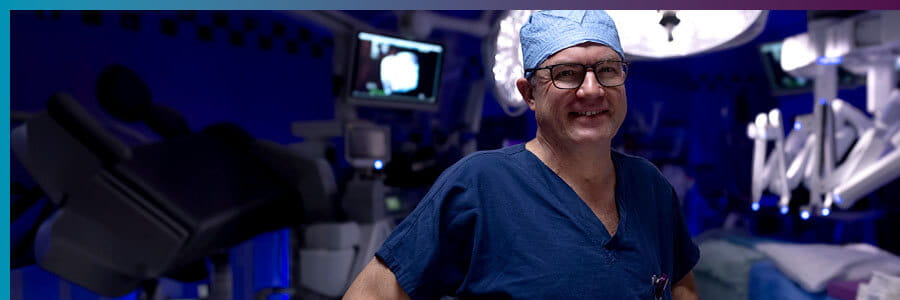Johannes Bonatti, MD, is a world-renowned expert in robotic cardiac surgery. The Austria native became the first surgeon in the world to perform a robotic endoscopic quadruple coronary bypass surgery.
When he arrived at UPMC in 2021, he saw the opportunity to continue to advance the field in a new location.
"With Pittsburgh's history of being such a powerful industrial city early on and now reinventing itself, I thought robotics, surgical mechanics, and advanced technology would be a perfect fit into this city," says Dr. Bonatti, director, Cardiac Robotic Surgery, UPMC Heart and Vascular Institute.
As an early pioneer in robotic surgery, Dr. Bonatti and his fellow surgeons in Europe collaborated in learning the process. He now is helping to teach younger surgeons the intricacies of robotic surgery.
He also brought his prior experience to UPMC to expand the breadth of surgical options the UPMC Heart and Vascular Institute can offer. He completed more than 5,000 cardiac surgeries before joining UPMC, with 1,000 of those done robotically.
“A completely endoscopic coronary bypass grafting procedure hadn't been done at UPMC," Dr. Bonatti says. "In the first year that I arrived at UPMC, I was able to introduce this technique with support from the team. And we have expanded into doing this both on the stopped heart and on the beating heart."
In 2023, Dr. Bonatti and interventional cardiologists at UPMC performed the first simultaneous hybrid procedure combining robotic coronary artery bypass graft surgery (CABG) with percutaneous coronary intervention (PCI).
Dr. Bonatti is an advocate for the benefits of robotic surgery. It is a less invasive option than a traditional sternotomy, which requires cutting into and separating the sternum.
Robotic surgery uses much smaller incisions. The surgeon controls the arms of the robotic machine via a computer console. A camera attached to the robotic machine transmits high-definition images to the surgeon. The machine's wide range of motion allows for more precise cuts.
Because robotic surgery is less invasive, patients typically have a much shorter recovery.
"I will tell patients, you may have heard that heart surgery requires a large incision in the chest," Dr. Bonatti says. "It is my goal to eliminate that aspect and do these procedures through smaller access. This is where the robot comes in. The robot helps me to do these procedures very precisely and in the most effective manner."
Dr. Bonatti says he was excited to join the UPMC Heart and Vascular Institute, one of the top cardiovascular programs in the United States.
"We have everything that can be done in heart surgery right here," he says. "There's nothing missing. We have ICU, we have advanced heart failure care, we have transplant, we have aortic surgery, and less invasive heart surgery at the most advanced level. That's what excites me. It excites me that I can work with colleagues who deal with the most advanced level in these other fields."
Dr. Bonatti says he also is excited about the future of robotic surgery. In the next five to 10 years, he expects to see advances as new technology is developed. Artificial intelligence is already playing a part in robotic surgery, and that role also could increase.
"What excites me is being part of the robotic heart surgery of the 21st century and being able to redesign bypass surgery, or mitral surgery, to reengineer that whole process and make the operation more attractive for the patient," Dr. Bonatti says.
At UPMC, Life Changing Medicine means advancing medicine to benefit our patients.
Find Care Near You
























